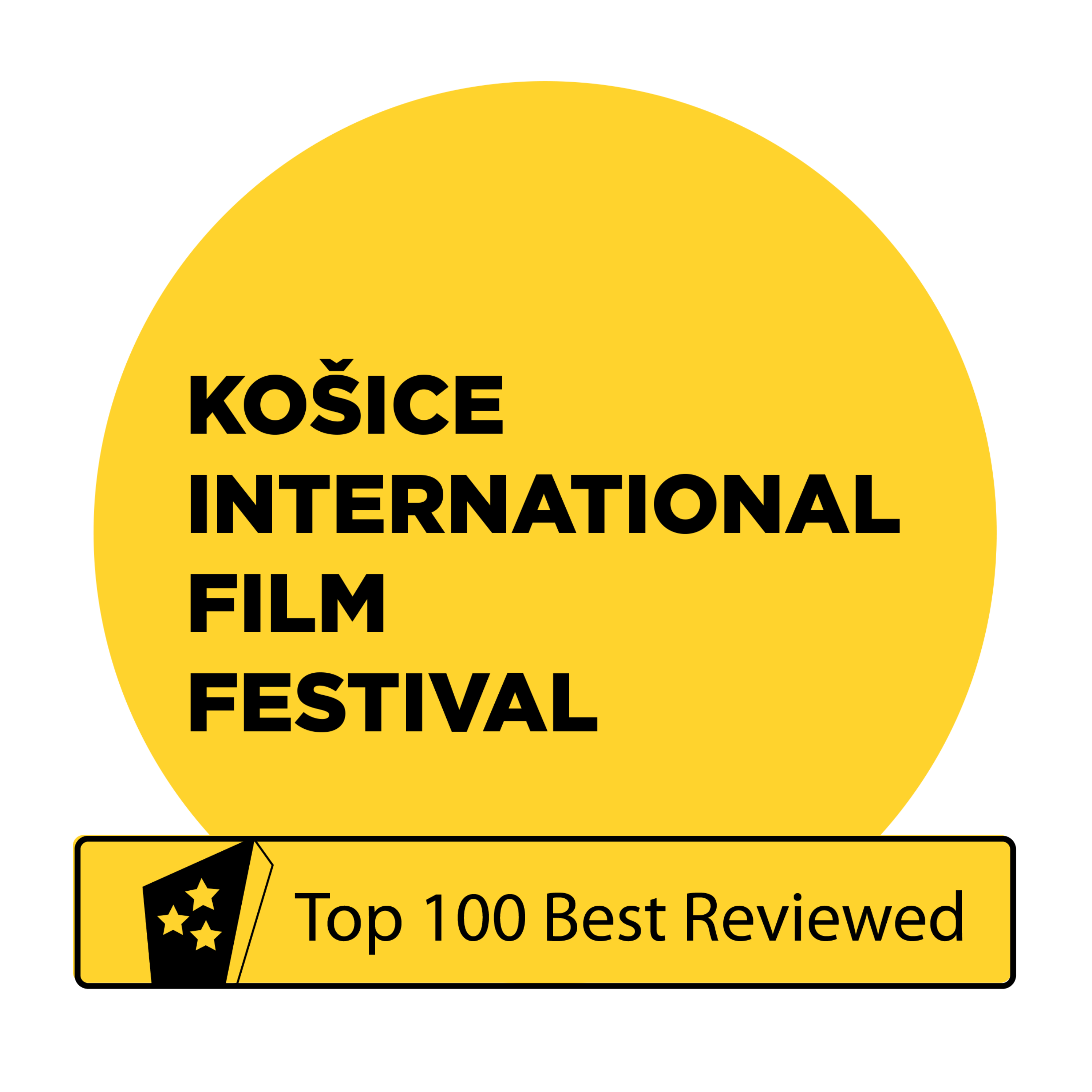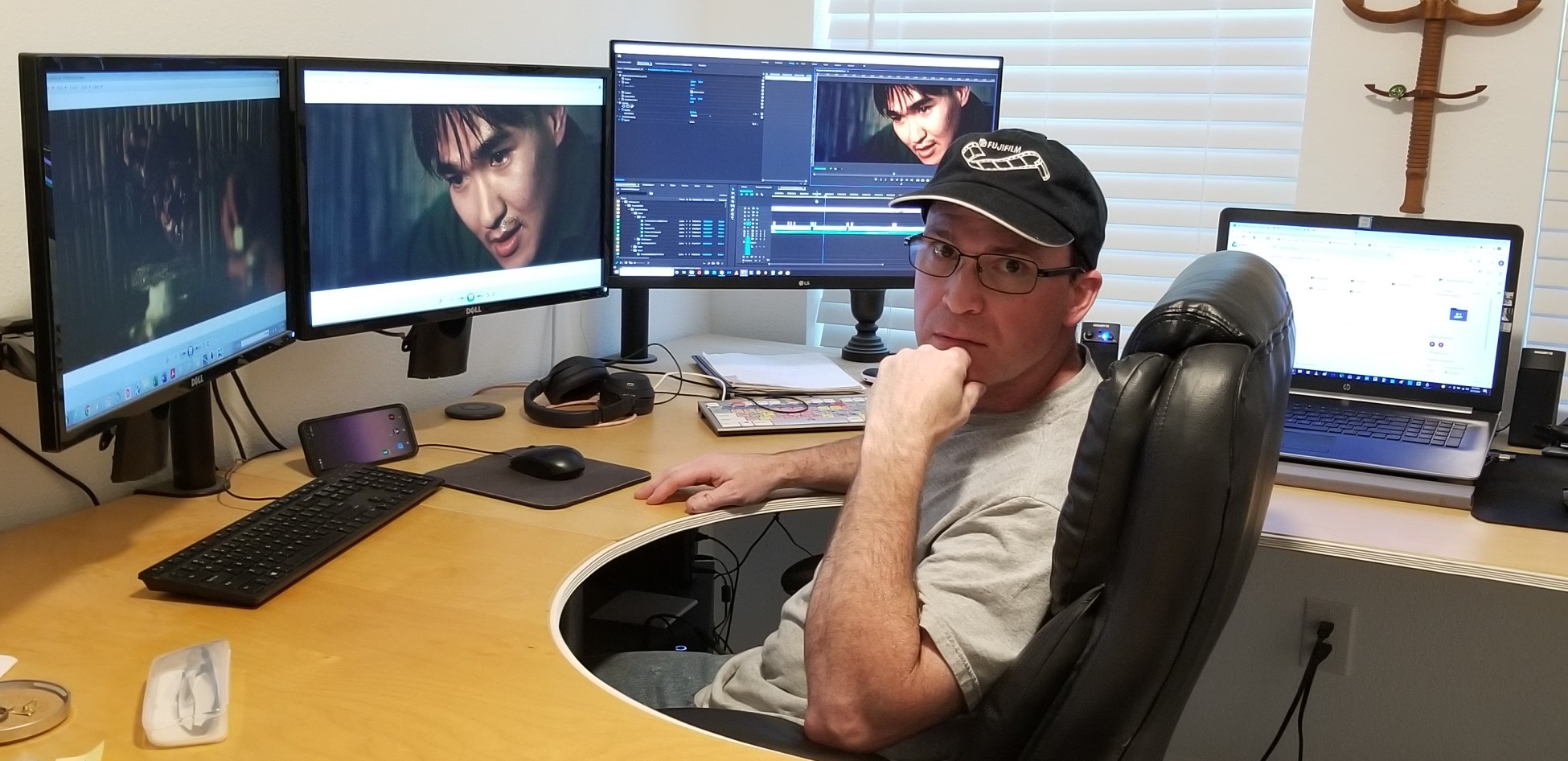Dennis Trombly
Dennis Trombly is an award-winning American filmmaker who was born and raised in the suburbs of Detroit, Michigan. He developed an interest in art and storytelling from a young age. He describes his style of art as a single frame that tells a story. He wrote his first short story, “Lost Atlantis”, at age 13 and was awarded Best Artist at age 14.
He initially pursued a career in robotics engineering, but changed his path after a film studies professor recognized his talent and passion for filmmaking. He studied mass communications at the University of Michigan-Flint, where he had the opportunity to work at the PBS TV station. He then moved to Southern California to attend Chapman University, where he earned his MFA in film production with an emphasis in all areas of filmmaking. He also received a Panavision grant to shoot his thesis film.
He has produced, directed, written and edited several short films and TV projects, including “Truce” (2005), “Sacred Belonging” (2020) and “Man in the Mountain” (2023). His most recent work is a prequel TV pilot to Steven Spielberg’s “Close Encounters of the Third Kind”, which he released on YouTube in 2022. He hopes to make films that are timeless and memorable, like the classics he admires.
What is the story behind your film?
This story evolved around two screenplays and another film by Steven Spielberg. The initial film, Amended, was a 5-minute short film with no dialogue. The second screenplay is 240-page Sci-Fi called Man in the Mountain. One day, driving down the freeway, I saw a picture of Devil’s Tower (in Wyoming, USA) and knew I wanted to make a prequal to Steven Spielberg’s, Close Encounters of the Third Kind. My original film was indeed the prequal, but Sony Studios denied permission for likeness and the film evolved to Man in the Mountain. This short film, a TV Pilot, is about part 3 or 9 to the series.
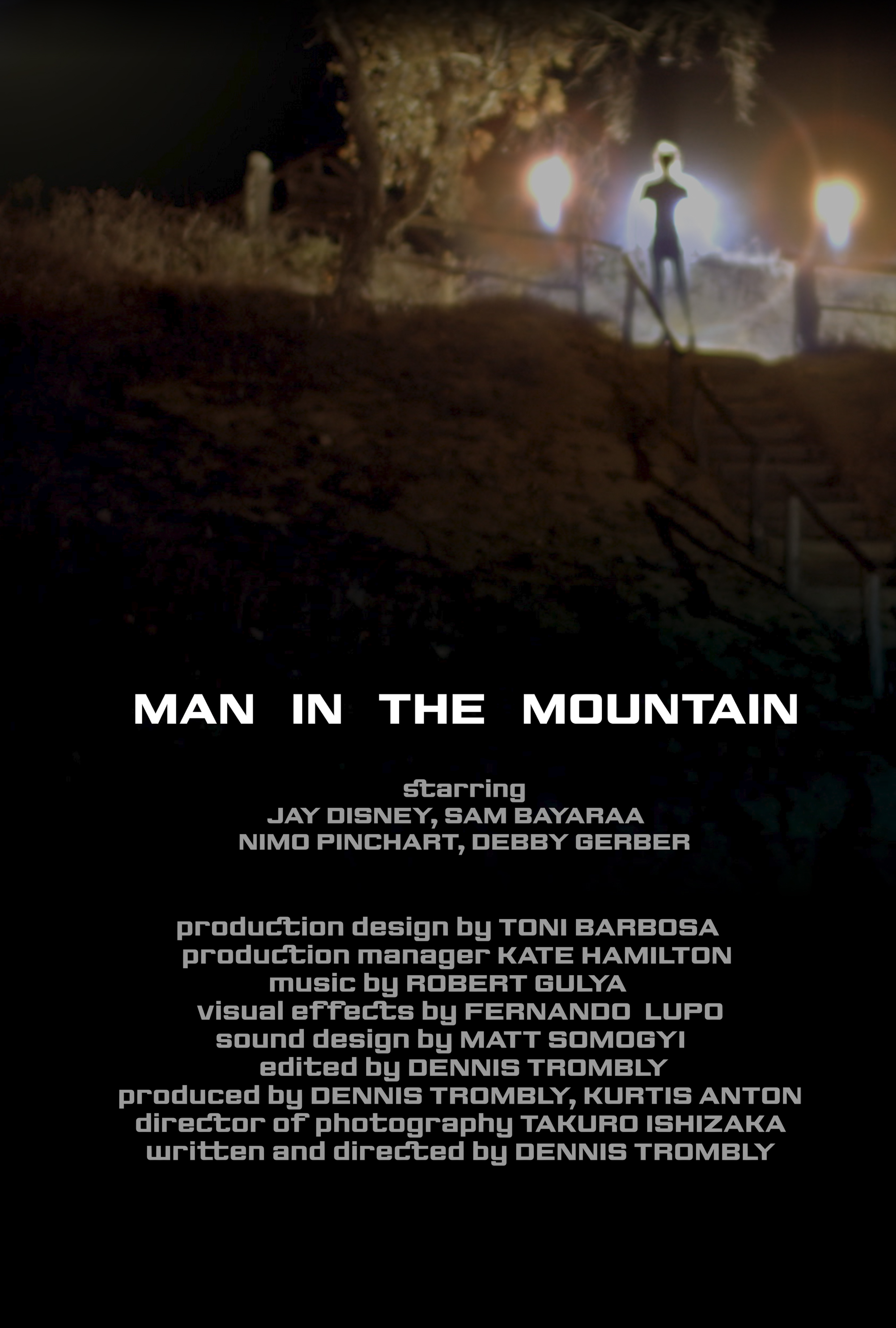
What should people take away, gain, realize after watching your film?
With the ongoing pressures in UFO and Extraterrestrial Phenomena, there are mixed signals. For the most part, the feedback is that this project should get a green light to be a streaming series.
Do you think that films can change people for the better or for the worse?
There is not doubt that my characters change for the better. There is a search for the truth in not only the existence of alien life but the search for inner truth, a self-discovery.
How was the creation of your project at the time of COVID-19?
The pandemic was devastating for many people in Southern California and production was all but nearly shut down, but many actors and crew were eager to work. With many Covid Safety factors in play, having multiple Covid Officers on the set, we were able to shoot this project and are proud to say there were no covid incidents during production.
What creation style did you use in the production of your project? What cameraman elements did you use?
Going into production I told Takuro (cinematographer) my goal was to try to get all the lighting in camera. This was both a style for the production and technique for the cameraman. I had a lot of tracking shots and achieving moving pictures with moving shots without interrupting the audience experience is truly a joy. The entire camera crew was challenged to the limit of our capacity and impressed with the results. There were some scenes we had to remove from the script because it was not in the budget to obtain as much lighting needed to produce a desired effect. Sticking with original idea was Watching dailies was on opportunity to start to get a feel for the film. My goal was to focus on the story and characters. With that said, keeping the camera with characters in the shot was important.
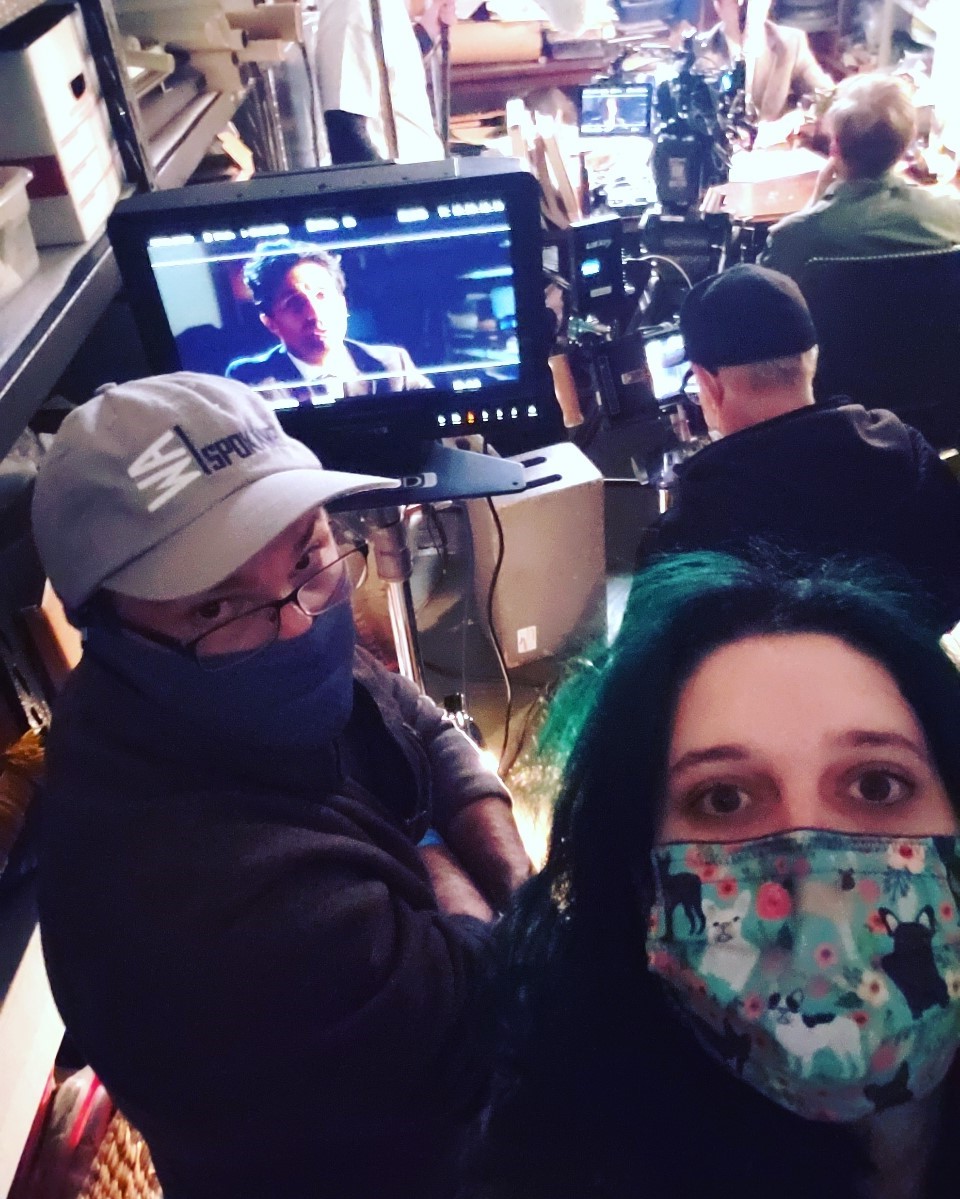
How did you select the actors for your project?
Casting was accomplished with casting calls. There were over 1000 submissions for just 5 roles. It sounds like a lot but the electronic submission process simplifies the process until eventually it was narrowed down to about 50 request for taped auditions. It quickly narrows down the selection after watching the tapes. I prefer to have face-to-face final auditions, but Covid made it very difficult and submitted tapes were done for about 30 chosen actors and narrowed it down to the final selections.
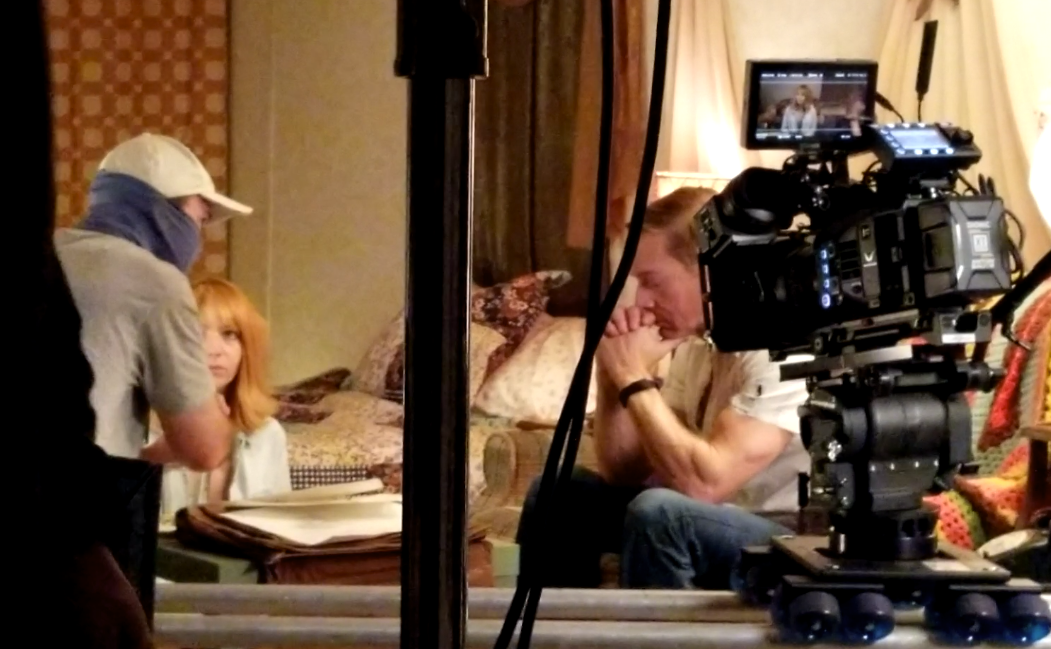
Why do you think your film should appeal to distributors?
The concept for a series, and the demand for content, is what may appeal to investors and distributors. Showcasing what can be done for less budget is a bonus and less risk. Working with enthusiastic filmmakers that want to take part in the project excelled the film to what we have today.
How did your acquaintances react when they first saw the film?
They were amazed at what was accomplished in just 9 shooting days. One principal actor told me that he never knew what I was thinking on the set but now sees the results. I’m blessed with the skill of observation and try to capture the key moments through the lens, that’s all that matters. Everything else surrounding the frame does not exist to an audience and should not hinder the process or experience.
If you could change something in your film, what would it be?
More time, more funding. With more time (and funds) the short film would be a feature film. Capturing the vision of the script during production takes time and money. With limited resources the original idea takes a few steps down. We captured what we could with the personal funding and time allotted and proud of the results.
Which movies are your favorites and why?
Back to the Future had the greatest impact on me to become a filmmaker. I think it had to do with watching it at a very young age and the impression it had on me. Still today, the film had so many elements to duplicate in a film structure that hold true today (script structure, characters, story, music, cinematography, editing). Regardless of the genre of film, understanding what makes a film great is important. I have many favorites, classics like Rashomon, 12 Angry Men, and To Kill a Mockingbird to Dark Knight, 1917, The Fabelmans and Oppenheimer but noting one that had the greatest influence.
What topics do you like to address in your stories?
I enjoy stories that reveal human behavior, exposing what makes them who they are today and what happened in the story for them to change. Putting the audience in the shoes of the character is the best part.
What is your motivation in making films?
The greatest motivation is to make films like the classics we endure. I talk to more filmmakers and viewers today that are tired of films full of fancy, fast moving images and just don’t want to see superhero films at the top of the charts every year. I found it very unfortunate that new filmmakers studying today are not being exposed to more of the classics. Though, the trend of getting back to the basics has been highlighted in conversations with other filmmakers.
Which contemporary filmmakers motivate you the most?
Though I hope to have my own style, the living directors I like to study are Anderson, Mendes, Nolan, Scorsese, Spielberg, Scorsese, Nolan, Anderson, and Mendes.
What projects do you plan to shoot in the future?
I have three projects in the works. One of them is another TV Pilot, a martial arts drama. The plan is a mixture of Motion Capture to animate the characters in addition to live action. The second film is a powerful drama, with few locations, as to produce it for less. There are some interested people interested but they would like to line up pre-sell and/or team with a distribution company (that can offer a decent contract). The third film is based on a true story. I can’t go into details but this person, now deceased, has a story to be told and the looking to connect with another producer with the same interest and get rights from the family to write a screenplay.
He initially pursued a career in robotics engineering, but changed his path after a film studies professor recognized his talent and passion for filmmaking. He studied mass communications at the University of Michigan-Flint, where he had the opportunity to work at the PBS TV station. He then moved to Southern California to attend Chapman University, where he earned his MFA in film production with an emphasis in all areas of filmmaking. He also received a Panavision grant to shoot his thesis film.
He has produced, directed, written and edited several short films and TV projects, including “Truce” (2005), “Sacred Belonging” (2020) and “Man in the Mountain” (2023). His most recent work is a prequel TV pilot to Steven Spielberg’s “Close Encounters of the Third Kind”, which he released on YouTube in 2022. He hopes to make films that are timeless and memorable, like the classics he admires.
What is the story behind your film?
This story evolved around two screenplays and another film by Steven Spielberg. The initial film, Amended, was a 5-minute short film with no dialogue. The second screenplay is 240-page Sci-Fi called Man in the Mountain. One day, driving down the freeway, I saw a picture of Devil’s Tower (in Wyoming, USA) and knew I wanted to make a prequal to Steven Spielberg’s, Close Encounters of the Third Kind. My original film was indeed the prequal, but Sony Studios denied permission for likeness and the film evolved to Man in the Mountain. This short film, a TV Pilot, is about part 3 or 9 to the series.

What should people take away, gain, realize after watching your film?
With the ongoing pressures in UFO and Extraterrestrial Phenomena, there are mixed signals. For the most part, the feedback is that this project should get a green light to be a streaming series.
Do you think that films can change people for the better or for the worse?
There is not doubt that my characters change for the better. There is a search for the truth in not only the existence of alien life but the search for inner truth, a self-discovery.
How was the creation of your project at the time of COVID-19?
The pandemic was devastating for many people in Southern California and production was all but nearly shut down, but many actors and crew were eager to work. With many Covid Safety factors in play, having multiple Covid Officers on the set, we were able to shoot this project and are proud to say there were no covid incidents during production.
What creation style did you use in the production of your project? What cameraman elements did you use?
Going into production I told Takuro (cinematographer) my goal was to try to get all the lighting in camera. This was both a style for the production and technique for the cameraman. I had a lot of tracking shots and achieving moving pictures with moving shots without interrupting the audience experience is truly a joy. The entire camera crew was challenged to the limit of our capacity and impressed with the results. There were some scenes we had to remove from the script because it was not in the budget to obtain as much lighting needed to produce a desired effect. Sticking with original idea was Watching dailies was on opportunity to start to get a feel for the film. My goal was to focus on the story and characters. With that said, keeping the camera with characters in the shot was important.

How did you select the actors for your project?
Casting was accomplished with casting calls. There were over 1000 submissions for just 5 roles. It sounds like a lot but the electronic submission process simplifies the process until eventually it was narrowed down to about 50 request for taped auditions. It quickly narrows down the selection after watching the tapes. I prefer to have face-to-face final auditions, but Covid made it very difficult and submitted tapes were done for about 30 chosen actors and narrowed it down to the final selections.

Why do you think your film should appeal to distributors?
The concept for a series, and the demand for content, is what may appeal to investors and distributors. Showcasing what can be done for less budget is a bonus and less risk. Working with enthusiastic filmmakers that want to take part in the project excelled the film to what we have today.
How did your acquaintances react when they first saw the film?
They were amazed at what was accomplished in just 9 shooting days. One principal actor told me that he never knew what I was thinking on the set but now sees the results. I’m blessed with the skill of observation and try to capture the key moments through the lens, that’s all that matters. Everything else surrounding the frame does not exist to an audience and should not hinder the process or experience.
If you could change something in your film, what would it be?
More time, more funding. With more time (and funds) the short film would be a feature film. Capturing the vision of the script during production takes time and money. With limited resources the original idea takes a few steps down. We captured what we could with the personal funding and time allotted and proud of the results.
Which movies are your favorites and why?
Back to the Future had the greatest impact on me to become a filmmaker. I think it had to do with watching it at a very young age and the impression it had on me. Still today, the film had so many elements to duplicate in a film structure that hold true today (script structure, characters, story, music, cinematography, editing). Regardless of the genre of film, understanding what makes a film great is important. I have many favorites, classics like Rashomon, 12 Angry Men, and To Kill a Mockingbird to Dark Knight, 1917, The Fabelmans and Oppenheimer but noting one that had the greatest influence.
What topics do you like to address in your stories?
I enjoy stories that reveal human behavior, exposing what makes them who they are today and what happened in the story for them to change. Putting the audience in the shoes of the character is the best part.
What is your motivation in making films?
The greatest motivation is to make films like the classics we endure. I talk to more filmmakers and viewers today that are tired of films full of fancy, fast moving images and just don’t want to see superhero films at the top of the charts every year. I found it very unfortunate that new filmmakers studying today are not being exposed to more of the classics. Though, the trend of getting back to the basics has been highlighted in conversations with other filmmakers.
Which contemporary filmmakers motivate you the most?
Though I hope to have my own style, the living directors I like to study are Anderson, Mendes, Nolan, Scorsese, Spielberg, Scorsese, Nolan, Anderson, and Mendes.
What projects do you plan to shoot in the future?
I have three projects in the works. One of them is another TV Pilot, a martial arts drama. The plan is a mixture of Motion Capture to animate the characters in addition to live action. The second film is a powerful drama, with few locations, as to produce it for less. There are some interested people interested but they would like to line up pre-sell and/or team with a distribution company (that can offer a decent contract). The third film is based on a true story. I can’t go into details but this person, now deceased, has a story to be told and the looking to connect with another producer with the same interest and get rights from the family to write a screenplay.
